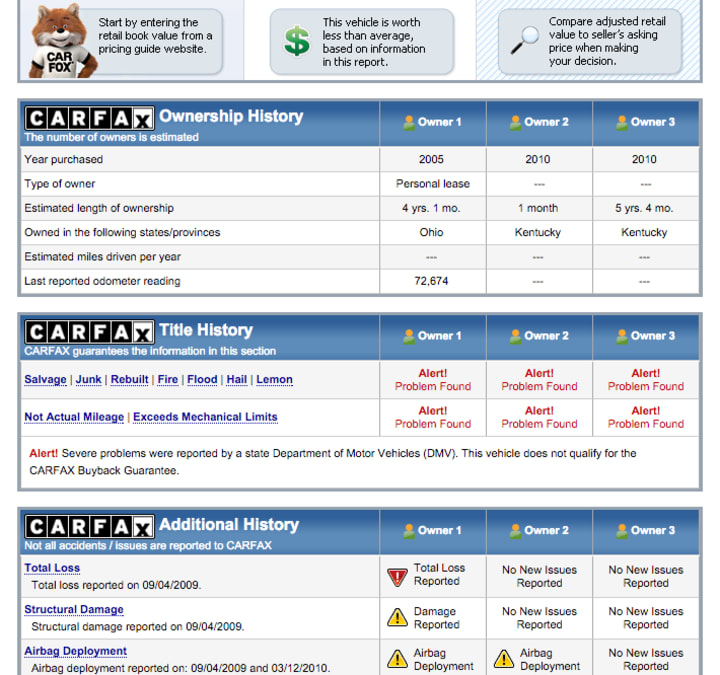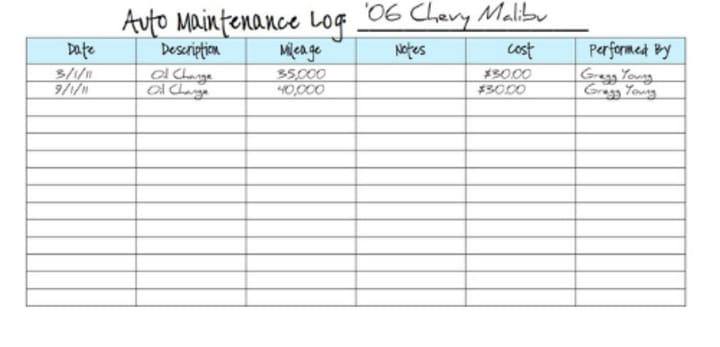How to Tell If You're Buying a Lemon
There is no feeling quite as crushing as acquiring a supposedly immaculate car at a hard to beat price, only to later on learn that you spent your hard-earned dollars buying a lemon.

Buying a lemon, if you are not acquainted with the term, is buying a vehicle that does not perform to par as its dealer promised.
The entomology of alluding to second-hand cars in deprived conditions as “lemons” was popularized by the advertising agency, Doyle Dane Bernbach when advertising the Volkswagen Beetle in the 1960s. Since then, the term has become a time-worn cry for each unfortunate car owner who has been tricked into buying a wreck.
To ensure you’re not the next unfortunate car owner pursuing a lemon law case, make sure to know ways to tell if the next ride you’re about to buy is a lemon.
Request a vehicle history report.

Photo by Kartik Bhattacharjee
When it comes to determining whether the used car you’re about to acquire is a lemon, there is no better first step than to get the car’s history report. There are two well-known services that provide this information at an affordable price; AutoCheck and Carfax.
It does not really matter from whom you receive the report though; so long as you have the Vehicle Identification Number (VIN), you should find everything you need to know about the car. The most important thing is that you receive a detailed report of any accidents the car may have encountered in the past, the car’s previous owners (if any), what the current title is, and the number of times it needed repairs.
Ask for the maintenance and service records.

Photo by rawpixel
Every reputable seller or dealership will have all maintenance and inspection records dating back to the last one year, which is a tip for buying a car from a dealer you should definitely know. If these are missing, that’s a green light for you to run fast in the opposite direction, as it implies it could possibly be stolen or was in a gruesome accident.
If the records are available, take a detailed look at the repair history and find any recurring repairs. A vehicle history report of a lemon will usually boast reoccurring issues that are easy to notice. Also note whether the vehicle’s problems were due to wear and tear issues, such as brakes or clutch, or a more serious complication.
Furthermore, also check to see if the repairs were performed when the car was still new. That can help you confirm whether the vehicle is indeed a lemon.
Ask as many questions as possible.
From my firsthand experience, asking lots of questions is one of the most important things you need to do. Do not hesitate to ask any inquiries you may have about the quality of the vehicle you are looking to buy. After all, you're about to invest a pretty huge amount on this car, so you ought to find out everything you can about it.
Ask the dealer where it came from, what the previous seller was like, how it drives, request all maintenance records, and don’t leave without a written warranty. Ask, ask, and keep asking.
Ask where the maintenance was executed and, if you can, visit the shop and ask that mechanic whether there are certain issues the dealer may not be telling you about (being wary of the ways to identify how to tell if your mechanic lied to you).
Other questions you should ask include:
- Has the car ever been repainted?
- Do all locks and windows work?
- Does the car pass safety and emissions?
- Is the car four-wheel drive? If so, does it work as it should?
- How about the wear on brakes and tread on tires?
The more questions you ask, the better your chance of knowing whether or not you’re buying a lemon.
If you feel like the dealer/seller is lying, run for the hills.

This tip is more of a gut feeling than logic. Ask any seasoned car buyer and they’ll tell you that most, if not all the time, your gut is always right. If at some point you feel pressured or uncomfortable, that’s a massive red flag that something is not right.
A genuine dealer/seller should not pressure you into making any decisions. Acquiring a car should be an exhilarating experience, and comparatively smooth. You ought to be able to build up trust with the seller from the first handshake. If that’s not the case, ditch the car and move on to a different seller.
Make sure it passes a pre-purchase inspection.
To make sure the car works as described, you are going to have to go beyond the vehicle history report and personally inspect it. If you get lazy and just skim over the history and maintenance report, you may miss a dire issue, which may cause serious problems down the road.
The best place to start is the outside, followed by the inside. Take a full stroll around the vehicle to make sure the car's manufactured the way it was intended to be, looking for any mismatched parts, paint chips, broken light fixtures, dents, or any other perceptible damages.
Also be sure to find things such as paint sprays on the rubber trim, chrome, or the car’s wheel wells. These are sure signs of extensive body panel repair.
A good look from the exterior can tell you a lot about the car in question, but nothing beats inspecting the car yourself from the inside. Missing knobs or handles, a cracked dashboard, and a sagging headliner are all signs you’re looking at a defective vehicle. Sagging driver’s seat and worn out pedals are also signs that the car has a high mileage. Furthermore, an airbag warning light that stays lit indicates that the bag was deployed recently, but wasn’t properly replaced.
There are hissing or knocking sounds.
Here comes another common sense thing you should be aware of. Get into the car, turn it on, and listen for any noises that sound worrisome or “not normal.” Notably, listen for any hissing or knocking sounds coming from beneath the hood.
A knocking sound could signify a major complication, such as a head gasket or piston that’s about to blow. Hissing sounds, on the other hand, signify there may be fluid leaking that's hitting the hot engine below.
Any peculiar sounds coming from anywhere inside the car should freak you out, and make you hold onto your wallet tightly while you head out the door.
The car has a loose steering wheel.

From making turns to maintaining a fixed course, you rely on your car’s steering wheel each time you set foot in the driver’s seat. This imperative system permits you to steer your car down the road toward your destination; which means if the car’s steering wheel is loose, it is time to walk away from the deal, lest you risk losing control of your car while driving at a high speed.
A loose steering while signifies bad alignment, slack, or possible fluid issues—none of which sounds like great news. A good car’s steering wheel should feel responsive, but tight and controlled.
There are misaligned body parts.
Misaligned body parts in a vehicle are one of the most frequently observed imperfections in lemons. Worst yet, what most car dealers try to explain as minor surface irregularities could be concealing something way more sinister, like a major accident. This is why it is crucial to ensure that body panels, car doors, as well as the hood gaps and the trunk are evenly aligned.
For example, a vehicle with a CAPA sticker on one of its parts is a sure sign that the vehicle has undergone collision repair.
The odometer has been manipulated.
The average mileage on a car hangs around 10,000 miles per year. If the figure on the odometer does not match the age and appearance of the car you’re looking at, then something shady may have happened before you've been showed the vehicle.
To confirm your suspicion, inspect the car’s exterior condition. A vehicle that has been on the road for a long time will exhibit several chips made by gravels across the bumper, grille, and bonnet. A car with low miles recorded should not showcase signs of superficial wear and tear.
Is the check engine light malfunctioning?

Engine lights are the windows to your car’s soul, and unfortunately, there are many reasons why your check engine light is on in instances they do appear on your dashboard. They grant you a live showcase of your vehicle’s performance and allow you to guide it more effectively. So, if any car dealer tells you that the malfunctioning engine light is not that big of a deal, do not dare take him at his word.
Get a seasoned mechanic to utilize an Onboard Diagnostic (OBD) code reader to find out the error code. You should then research the specific code and confirm whether it is a complication worth worrying about.
Beware of buying a lemon.
If you still think the issues with the vehicle in question are negligible, you can send the car to a trusted mechanic for further pre-purchase inspection. Someone with automotive experience will be able to assess the repair attempt costs behind the car’s wear and tear. All things considered, I advise against buying a lemon, regardless of what the mechanic suggests.
If you buy a new car, but then, later on, realize it is a lemon, you can pursue state laws or federal lemon laws put in place to settle lemon law cases. Established in 1975, this federal and state lemon law states that, “[I]f a car buyer cannot repair a faulty vehicle, the manufacturers must provide a refund or replace the vehicle."
Another law in place to protect you is the Magnuson Moss Warranty Act that was passed by Congress in 1975 to promote consumer protection. The Act states that any seller should provide his or her customers with clear and detailed information about the product's warranty; in this case, the lemon car.
About the Creator
Mike Mavenful
Baby boomer, Pharmacologist, Movie reviewer and proud grandfather.







Comments
There are no comments for this story
Be the first to respond and start the conversation.